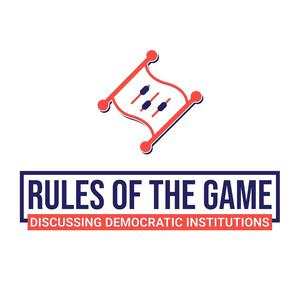54 odcinków
- With Colin Cole I discuss the work of More Equitable Democracy, a racial justice organization to advance racial equity by transforming electoral systems. As the US electoral systems are almost exclusively built as winner-take-all elections that serve only the two parties in power, they don’t deliver fair representation. But how can more minorities’ representatives be elected into state parliaments, city councils and finally the US Congress?
Colin shares with us some of the key historical events related to electoral reforms during the Progressive Era and what we can learn from those for current and future reform efforts. A main strategy of More Equitable Democracy is to advocate for electoral reforms at the local level, where change is viable. Start small, start local, and make people experience the difference an electoral system can produce in better representing society.
Colin Cole is the Director of Policy, Outreach, and Communications of More Equitable Democracy that launched in January 2018 and serves as a nonprofit intermediary that works with communities of color to improve democratic institutions. Colin’s responsibilities include co-developing and advising on the creation of reform proposals, helping build coalitions led by traditionally underrepresented communities, and developing and maintaining relationships with strategic partners. Colin is also a co-founder of FairVote Washington, a Washington State organization dedicated to advancing proportional representation, and previously worked in political fundraising for Senator Maria Cantwell, in grassroots lobbying on progressive tax reform for All In for Washington, and the Bernie 2016 Presidential Campaign.
Find a full transcript and links to all material discussed in the show notes.
Schedule: 00:00 Introduction / 03:53 Personal questions / 14:58 Main discussion / 57:55 Recommendations by Colin Cole.
Find the website of More Equitable Democracy here.
Please send feedback to [email protected]. If you find my discussions interesting and you’d like to support my work, consider buying me a coffee at buymeacoffee.com/rulesofthegame.
Please enjoy this conversation with Colin Cole. - With Friedrich Pukelsheim I discuss double proportional representation. Since 2006 the Canton of Zurich in Switzerland uses double proportionality to elect its 180 members of parliament. Friedrich Pukelsheim was invited to design an electoral system that would deliver on the promise of overall proportional representation in the canton while keeping the existing electoral districts since they are meaningful social and geographic entities. The complication is that some of these districts are very small (4 seats) while others are large (up to 18 seats). So the problem to be solved was to achieve proportional representation and electoral equality while honoring those very diverse districts.
The resulting electoral system was double proportionality, nicknamed “Doppelter Pukelsheim” (“Double Pukelsheim”). Friedrich Pukelsheim has become well-known across Switzerland thanks to his successful design of an electoral system that fits the Zurich's requirements. He emphasizes, however, that the system was first discovered by Michel Balinski. As of now, 8 cantons in Switzerland have adopted a double proportional representation system.
Friedrich Pukelsheim is Professor Emeritus of Mathematics at the University of Augsburg in Germany. He got his doctoral degree in 1977 from the University Albert-Ludwigs University in Freiburg, and a Habilitation in 1982 from the same University. Still in the same year he became professor of mathematics and he has over time developed a special interest in the mathematical intricacies of electoral systems. Throughout his career he had research stays at the universities of Stanford, Cornell, Penn State, the London School of Economics and Political Science, among many others. Two books that treat the design of proportional electoral systems are Proportional Representation – Apportionment Methods and Their Applications, first published in 2014, and one in German: Sitzzuteilungsmethoden – Ein Kompaktkurs über Stimmenverrechnungsverfahren in Verhältniswahlsystemen, published in 2016. You can find all of his contributions on his website. You find links to all references in the show notes.
As a remark, this conversation was recorded in July 2024.
Find a full transcript and links to all material discussed in the show notes.
Schedule: 00:00 Introduction / 04:03 Personal questions / 6:08 Main discussion / 52:50 Recommendations by Friedrich Pukelsheim.
Find Friedrich Pukelsheim’s research here.
Please send feedback to [email protected]. If you find my discussions interesting and you’d like to support my work, consider buying me a coffee at buymeacoffee.com/rulesofthegame.
Many thanks to Ana Margarida Santos who co-produced this episode.
Please enjoy this conversation with Friedrich Pukelsheim. - With Degan Ali I discuss the system of international aid based on her inside experience of working in the sector for over two decades. She speaks truth to power and that really takes some bravery to do, and I honor that. Degan Ali shares many compelling stories from her home country Somalia, but also from several years of growing up and studying in the US. She explains how local agricultural markets were destroyed by foreign interference and how the Somali government is at the whim of foreign donor countries, instead of being accountable to its own people.
Listening to her perspective is really important and powerful, even though I don’t agree with all her viewpoints. With her voice and her work she tries to find ways to liberate Somalia from the traditional aid paradigm. As it is pointless to wait for the international aid system to change or even to leave Somalia, what seems the most promising way forward is to empower local civil society organizations and to raise their political profile to increase their leverage on the political stage.
Degan Ali has been at the forefront of shifting power for decades. She is the Executive Director of Adeso, an organization that made cash transfers a significant, legitimate method of delivering aid to vulnerable populations, beginning with the first large-scale cash transfer program during the 2011 Somalia famine. She is also a Rockefeller Foundation Global Fellow for Social Innovation, a contributor to the Overseas Development Institute, the Humanitarian Policy Group and the Global Food Security Journal. Her work has been featured on The New York Times, Al Jazeera and The Guardian.
As a remark, this conversation was recorded in June 2023.
Find a full transcript and links to all material discussed in the show notes.
Schedule: 00:00 Introduction / 04:57 Personal questions / 13:41 Main discussion / 42:46 Recommendations by Degan Ali.
Follow Degan Ali on X.
Please send feedback to [email protected]. If you find my discussions interesting and you’d like to support my work, consider buying me a coffee at buymeacoffee.com/rulesofthegame.
Many thanks to Ana Margarida Santos who co-produced this episode.
Please enjoy this conversation with Degan Ali. - With Armin Schäfer I discuss Germany's mixed member proportional electoral system and its current reform. We compare the old and the prospective new electoral system, and we explore what the most important and the most controversial changes are. Armin Schäfer shares not only historical context of the character of Germany’s political system but also his opinions on the reform process.
Important to mention is that just a few days ago, at the end of July 2024, the Federal Constitutional Court of Germany ruled that the electoral law passed by the German parliament in March 2023 is, in principle, in accordance with the Basic Law. However, the basic mandate clause, which was supposed to be abolished, must remain in place. This is especially important for smaller parties with strong regional representation that fail to cross the 5% electoral threshold that is also in place.
I recorded this discussion with Armin Schäfer before the ruling of the Constitutional Court. This means that while the arguments we make are absolutely relevant and valid, we were not able to anticipate the timing or outcome of the court ruling.
Armin Schäfer is a Professor of Political Science at the University of Mainz in Germany, with his research interests at the intersection of comparative political economy, democracy research and political theory. His recent research agenda focused on the interplay of social and political inequality, voter turnout, representation and responsiveness. Between 2018 and 2021 Armin Schäfer was head of the German Political Science Association (DVPW).
Find a full transcript and links to all material discussed in the show notes.
Schedule: 00:00 Introduction / 03:37 Personal questions / 06:34 Main discussion / 31:57 The reform / 52:09 Recommendations by Armin Schäfer.
Follow Armin Schäfer on X.
Please send feedback to [email protected]. If you find my discussions interesting and you’d like to support my work, consider buying me a coffee at buymeacoffee.com/rulesofthegame.
Many thanks to Ana Margarida Santos who co-produced this episode.
Please enjoy this conversation with Armin Schäfer. - In this episode of Rules in Perspective I review the podcast episode 42 on Democracy for Busy People, a discussion I had with Kevin Elliott.
My three takeaways from episode 42:
0:42 It’s important to include busy people in democracy.
3:55 Political parties and political competition are crucial. The better parliaments represent the people’s interests, the more democratic our political systems.
6:00 We should dare to fundamentally question our current institutions and think about unconventional propositions and ideas.
Listen to episode 42 and find the show notes here.
Kevin Elliott’s personal website.
It would be great to hear your opinion and feedback on this new format. If you want to send me an email, you can reach me at [email protected]. If you find my discussions interesting and you’d like to support my work, consider buying me a coffee at https://www.buymeacoffee.com/rulesofthegame
Related episodes:
The Citizens' Chamber in the Canton of Vaud with Rodan Bury and Charly Pache | Ep. 31:
Listen and show notes.
Fixing the House with Proportional Representation with Lee Drutman | Ep. 39
Listen and show notes.
Power-sharing institutions in multicultural societies – the case of Switzerland with Sean Müller | Ep. 6
Listen and show notes.
Youtube
Więcej Rządowe podcastów
Trendy w podcaście Rządowe
O Rules of the Game – discussing democratic institutions
What does it take to make democracy work? The Rules of the Game podcast discusses and compares democratic institutions from around the world. Institutions are the rules of the game of our societies that direct our everyday lives in fundamental ways. They determine whether we live in a free or repressed society – whether we can make our voices heard. Researchers, grass-roots political activists and politicians will join me on this journey of dissecting the struggle for fair representation in parliament, accountable executive governments, impartial justice, and direct democratic participation.
Strona internetowa podcastuSłuchaj Rules of the Game – discussing democratic institutions, British Council Language Assistants i wielu innych podcastów z całego świata dzięki aplikacji radio.pl

Uzyskaj bezpłatną aplikację radio.pl
- Stacje i podcasty do zakładek
- Strumieniuj przez Wi-Fi lub Bluetooth
- Obsługuje Carplay & Android Auto
- Jeszcze więcej funkcjonalności
Uzyskaj bezpłatną aplikację radio.pl
- Stacje i podcasty do zakładek
- Strumieniuj przez Wi-Fi lub Bluetooth
- Obsługuje Carplay & Android Auto
- Jeszcze więcej funkcjonalności


Rules of the Game – discussing democratic institutions
Zeskanuj kod,
pobierz aplikację,
zacznij słuchać.
pobierz aplikację,
zacznij słuchać.





















